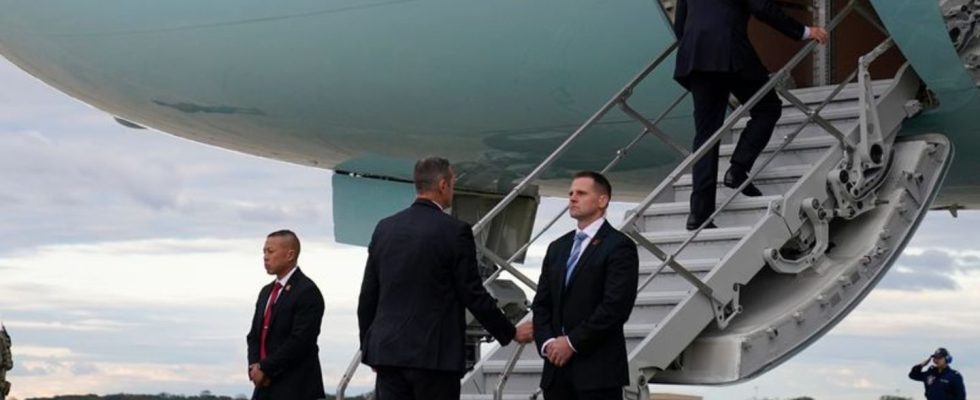War in the Middle East
Biden in Israel: Rocket strike in Gaza overshadows trip
US President Joe Biden sets off on his trip to Israel. photo
© Evan Vucci/AP/dpa
Biden actually wanted to prevent further escalation in the Middle East with the most important players. A devastating rocket strike in the Gaza Strip throws everything into disarray – and poses great danger.
It’s a journey in extremely dangerous times: US President Joe Biden is expected to make a short visit to Israel today. The 80-year-old wants to show support there after the devastating massacre in Israel by Hamas terrorists a few days ago. Biden will also ask the Israelis “hard questions” about how they will proceed in the conflict, as a government representative announced in advance. Biden’s trip is overshadowed by a devastating rocket strike in a hospital in the Gaza Strip, which is believed to have left hundreds dead and injured.
The incident dramatically increased tensions in the region, fueled concerns about an escalation and expansion of the conflict – and also threw Biden’s travel plans into chaos. The US President had to cancel an onward trip to Jordan at the last minute.
Biden originally wanted to fly from Israel to Jordan to meet Palestinian President Mahmoud Abbas, Egypt’s head of state Abdel Fattah al-Sisi and Jordan’s King Abdullah II. However, the meeting was canceled at short notice after the rocket hit the hospital in Gaza.
The attack in the Gaza Strip
Hundreds of people are said to have been killed and injured yesterday when a rocket hit a hospital in the Gaza Strip. The health authority, controlled by the Islamist Hamas, blamed the Israeli army. Israel’s army, on the other hand, blamed a Palestinian militant organization in Gaza. The exact number of deaths is still unclear. The information cannot yet be independently verified. There were spontaneous protests in several predominantly Muslim countries last night.
The US President expressed his dismay in a written statement. He said he was “outraged and deeply saddened” by the explosion at the hospital and the terrible loss of life it caused. Immediately after the incident became known, he spoke to Jordan’s King Abdullah II and Israel’s Prime Minister Benjamin Netanyahu and instructed his team to collect further information about what happened.
The thwarted plans
In response to the rocket strike, Palestinian President Abbas prematurely canceled a visit to Jordan where he was supposed to meet Biden today. Shortly afterwards, Jordan completely canceled the meeting with the US President. Kirby emphasized that those involved had jointly decided to postpone the meeting. It is understandable that, in view of the tragedy, Abbas wanted to return home for several days of mourning. Biden will speak on the phone with Abbas and al-Sisi on his return flight from Israel.
The US is keen to prevent the conflict from spreading in the region, and Biden is an advocate of personal conversations instead of phone calls and video links. The talks with Abbas, al-Sisi and King Abdullah II in Jordan would therefore have been all the more important. Asked why Biden did not postpone the entire trip given the incident at the hospital, a U.S. government official said Biden had important meetings coming up in Tel Aviv. Even if the meeting does not take place in Jordan, that does not negate the reasons for the trip to Israel.
The President’s Balancing Act
In Tel Aviv, Biden wants to meet, among others, for talks with Israeli Prime Minister Benjamin Netanyahu and Israeli President Izchak Herzog. The US government’s National Security Council communications director, John Kirby, said on the flight to Tel Aviv that Biden also wanted to meet Israeli rescue workers and speak to families who had lost loved ones or whose family members had been abducted by Hamas. Biden also plans to make a public statement during his visit.
Biden has to manage a difficult balancing act: On the one hand, he wants to express support for Israel after the brutal attack by Hamas. On the other hand, he also doesn’t want to give the Israeli side a blank check to strike back brutally and without regard for civilians. Kirby gave a foretaste of the US President’s balancing act: Biden wants to get a feel for the situation on the ground from the Israelis, hear more about their goals in the coming days and weeks, “and he will ask them some tough questions.” Biden wants to hear “where they think they are, where they think they want to go.” He will ask the questions “as a true friend of Israel.”
Kirby emphasized that Biden does not want the conflict to expand or deepen. The president will also address the humanitarian situation in the Gaza Strip – and reiterate “very, very clearly” the US demand that humanitarian aid must come to the area, “and not just on a one-off basis, but on a permanent basis.”
The role of the USA
The USA sees itself as Israel’s protective power. Every year they support the country with billions, a significant portion of which goes to defense against missiles and military technology. The USA helped develop the “Iron Dome” missile defense system, which has been in use since 2011. Among other things, it destroys short-range missiles in the air. Kirby said a meeting with Israel’s War Cabinet in Tel Aviv would also discuss what further support Israel needs. The US government emphasizes Israel’s right to self-defense and also advocates dismantling Hamas, which the West has classified as a terrorist organization.
At the same time, the US government is calling for the protection of the civilian population in Gaza. Asked whether Israel was abiding by martial law rules, Kirby said that given the dynamic situation, it would not be appropriate to respond one way or the other to individual events and reports. But he emphasized: “We will continue to speak with the Israelis about the absolute necessity of protecting innocent civilian life and upholding the laws of war.”

